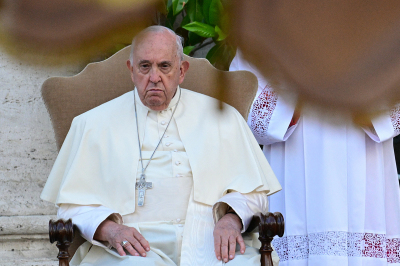
The era of Francis is over, and it is time to start the postmortems on his tenure.
Throughout his time as pope, Roman Catholic critics of Francis typically prefaced their remarks with an acknowledgment of his strengths: his care for the poor, his stand on abortion, his clarity on transgenderism. He was certainly solid on these matters, as one would expect any Christian with a basic catechetical knowledge of the faith to be. Yes, one might say, the pope was Catholic. But in other areas, he was more problematic.
Intellectually, he was always going to be lackluster compared to his two predecessors. It’s hard to measure up to the author of Love and Responsibility and a man who could discuss the problems of European culture with Jürgen Habermas. But this should have prompted Francis to place the intellectual project of Catholicism into the hands of serious thinkers. Instead, he appointed Victor Manuel Fernández to head the Dicastery for the Doctrine of the Faith. The position once held by Joseph Ratzinger, scholar of patristics and author of The Spirit of the Liturgy, is now held by the author of Heal Me with Your Mouth and Mystical Passion, which includes lurid ramblings about the theological significance of orgasms. It is as if Aquinas had been succeeded by Johann Tetzel.
Francis’s equivocal actions, or lack thereof, in the matter of Marko Rupnik were disturbing. Rupnik, the producer of what can best be described as creepy religious kitsch, stands accused of the most lurid sexual crimes. Expelled from the Jesuits in 2023, he was still officially listed as advisor to the Dicastery for Divine Worship and the Discipline of the Sacraments in 2024. Intentional or accidental? Neither speaks of a leadership concerned overmuch with the victims.
Francis made little secret of his disdain for conservative U.S. Catholic bishops, promoting instead the cause of those who most faithfully represent the spirit of the age. Archbishop Charles Chaput’s work for the people of Philadelphia, his writings for the wider Christian world, and his role in hosting the World Meeting of Families in 2015 should easily have merited a cardinal’s hat. It never came, and Francis accepted without hesitation his pro forma letter of resignation on his 75th birthday.
Archbishop Cordileone tried for years to gently persuade Nancy Pelosi not to support abortion, but to no avail. Finally, in 2022, he told her she would be barred from receiving Communion in the archdiocese of San Francisco. The archbishop was simply fulfilling his pastoral duty to care for his flock — and in this case, to care for the soul of someone who advocates for the destruction of innocent lives. Francis was happy to help in this situation. Sadly, though, his aid went to Pelosi, not the archbishop. He gave her the sacrament himself while she was visiting the Vatican. No doubt this reassured her that her evil was of no consequence to her or the unborn victims of her political ambitions. In the aftermath, I saw Archbishop Cordileone being interviewed at a conference. He refused to criticize the pope’s clear subversion of his authority. That is the mark of a Christian gentleman who understands how his church’s authority structure works and who cares for the souls under his care.
Francis’s love of creating chaos for his fellow priests was obvious. His recent comment that “all religions are paths to God,” and the confusion surrounding the translation of the text, is but one example. Then there were the constant sound bites that caused such trouble. At first, these seemed to be the inevitable concomitants of an elderly pope governing in an era of social media that he could not possibly understand. And yet over time, the persistence of the gaffes made them look more intentional and less pardonable.
Then there was the matter of blessings for same-sex couples — or, to be more precise, for those individuals in same-sex relationships. The fine distinction sowed more chaos and empowered those looking to shift the Catholic Church’s teaching in a progressive direction. It was perhaps appropriate that the first Jesuit pope reminded us of where the term “Jesuitical” originated.
Then there was the big sellout to the Chinese Communist Party. What a confusion of Church and state it is to allow the secular magistrate a role in choosing a bishop. But when that secular magistrate is a party with blood — Christian and otherwise — on its unrepentant hands, the problem is not merely a confusion of powers; it is an insult to everyone who has sacrificed, often in extreme ways, to oppose such criminals.
While China enjoyed a special deal, Francis’s constant carping at America and Americans grew tiresome. His recent letter to the U.S. bishops, in which he criticized the Trump administration’s policy on illegal immigration, was emblematic of his attitude of sanctimonious hypocrisy. Just a few months before, Vatican City had implemented its own draconian laws relative to unwelcome foreign intruders.
As a confessional Protestant, there is perhaps one decision Francis made that I should approve: restricting the Latin Mass. The need for vernacular liturgy was a standard part of Reformation Protestant policy. But even here, there was a problem. The Protestant Reformers’ liturgical changes were driven by a specific theology of the Word and its connection to salvation and sacraments. Catholicism’s theology of the sacraments is different and does not require liturgy in the vernacular. The pope’s move therefore, lacked any obvious doctrinal motivation. One can only speculate as to his motives, but it appeared to be a liberal assault on traditional Catholicism. Francis was thus my own worst Protestant nightmare: an authoritarian Roman pope driving a liberal Protestant agenda, a leader who embodied the worst of all possible Christian worlds.
Time will tell whether the next pope will follow in Francis’s footsteps and permit the continuation of liberal Protestant policies. It’s up to the men who will be gathering in the Sistine Chapel in the coming weeks. As a Catholic friend once said to me about the last papal election, the Holy Spirit never errs. But, he added, the same cannot be said for the College of Cardinals.
Originally published at First Things.
Carl R. Trueman is a professor of biblical and religious studies at Grove City College. He is an esteemed church historian and previously served as the William E. Simon Fellow in Religion and Public Life at Princeton University. Trueman has authored or edited more than a dozen books, including The Rise and Triumpth of the Modern Self, The Creedal Imperative, Luther on the Christian Life, and Histories and Fallacies.

















